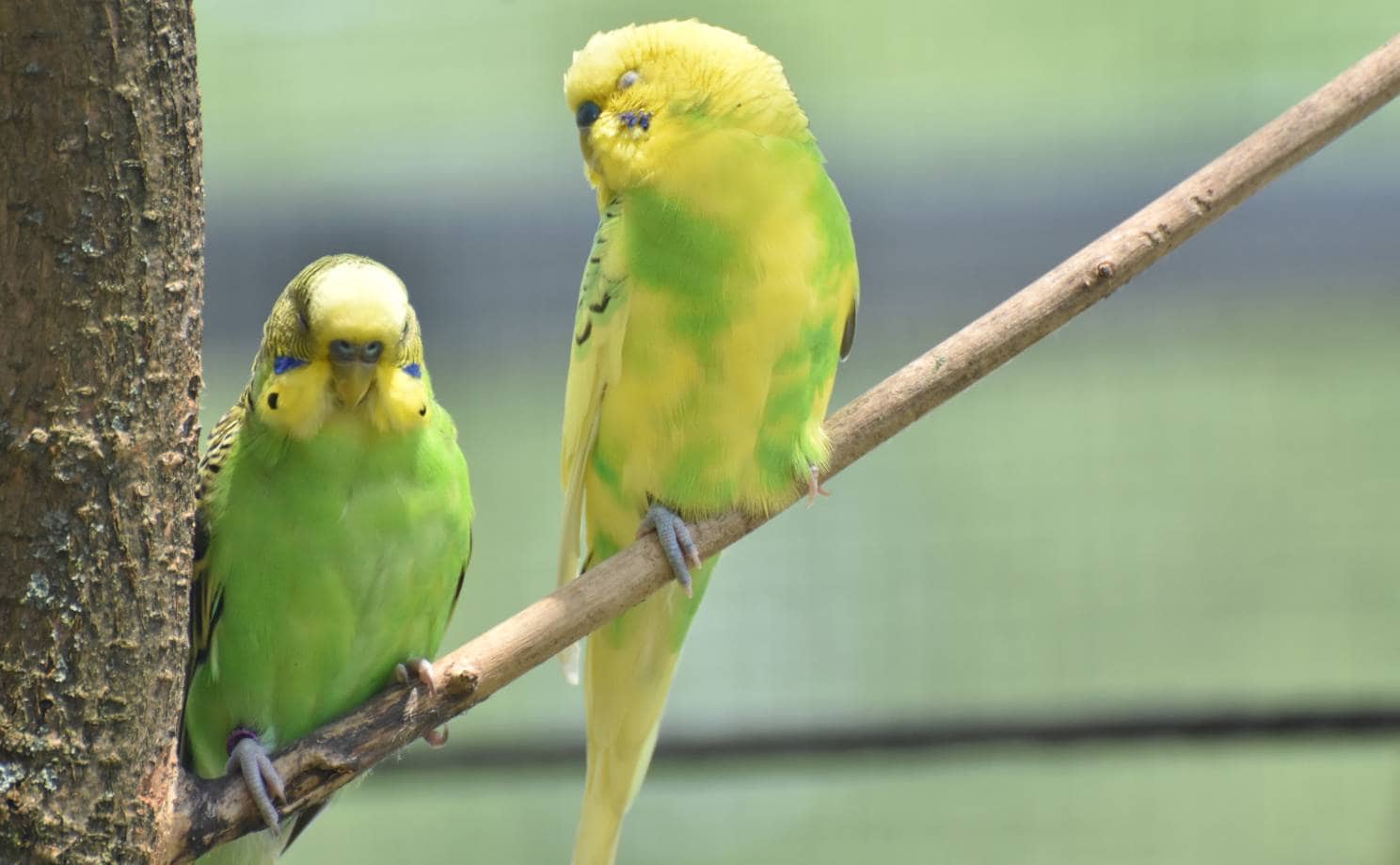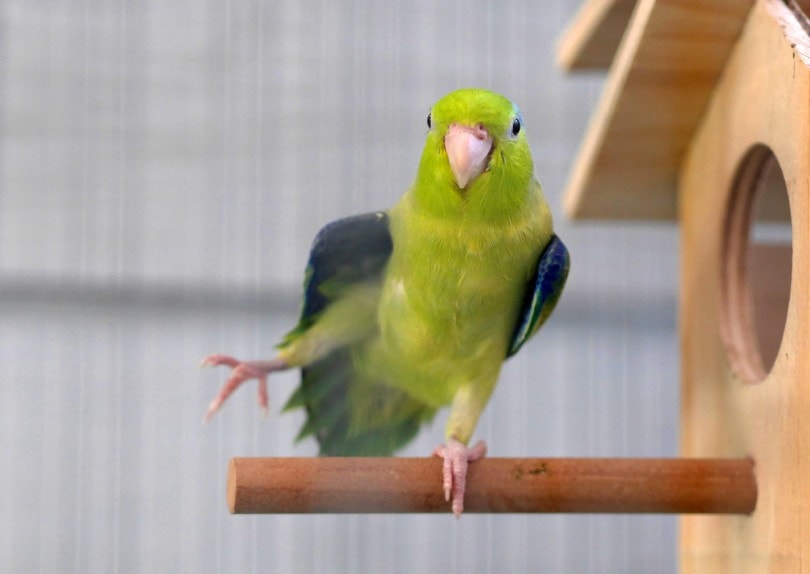
Parrotlets are the smallest parrot species, but don’t let their pint-size confuse you! These birds are big in personality. Parrotlets are bold and assertive birds, but they’re an absolute joy to raise.
One of the most challenging tasks of being a parrotlet owner is teaching it how to talk. Not only will you need quite a bit of time to achieve this task, but patience, too. While teaching your parrotlet to talk is possible, you shouldn’t expect it to talk as much as other parrot species.
Keep reading to find our tips and tricks for getting your parrotlet to repeat a few simple words and phrases back at you.
Before You Begin
Before you start training your bird to talk, there are some things you need to do in preparation.
Bond With Your Bird First
Before your parrotlet even thinks about talking to you or mimicking you, you’ll need to work on establishing a strong relationship with it. Happy and content birds that are comfortable around their owners will be more open to talking and training than lonely or afraid birds.
Set aside time every day to spend one-on-one with your parrotlet. Speak to it in a soothing and gentle tone, so it doesn’t become stressed or afraid. Play with your pet daily and use some of your one-on-one time singing and whistling to it.
Create a Calm Environment
Your parrotlet won’t be keen on training if its environment is stressful, loud, or unpredictable. So when preparing for a talking lesson, take your bird to a calmer area of your home. Kick out other family members walking around or hanging out in that room and turn off your cell phone and television. The fewer distractions there are, the calmer your bird will be and the more attention it will have to focus on you.

Have Realistic Expectations
Parrotlets can learn to talk, but you shouldn’t expect yours to have a vast vocabulary. They are not the best talkers in the parrot family but can learn a few words or phrases. As with most parrots, males will be better at talking than their female counterparts, but with time and patience, you can teach your female parrotlet to talk.
The 7 Tips & Tricks for Teaching Your Parrotlet to Talk
Now that you know what to do before trying to teach your pint-sized parrot a few words and phrases, let’s look at some helpful tips and tricks for getting your parrotlet speaking.
1. Be Consistent
Because parrotlets aren’t very talkative, set yourself up for success by committing to consistent training sessions. The more consistent you are with training, the better your chances of teaching your bird to talk.
Practice every day at the same time in the same room. Start with the same few words and phrases to not overwhelm your pet.
2. Practice Patience
You already know that parrotlets aren’t one of the most talkative parrot species, so you must be patient with your bird during your training sessions. It will take some time for it to learn how to talk, and you shouldn’t expect it to learn a new word in your first few training sessions. You might find your pet making babbling sounds as you’re trying to teach it, and that’s okay. Babbling is its way of trying to find its voice.
Don’t give up on your parrotlet.

3. Talk to Them All the Time
One of the best ways to expose your bird to speech is simply by talking or singing to it whenever you’re together. Your parrotlet will learn words by imitating what it hears, so the more you speak to it, the better your chances are of teaching it to talk.
Use simple phrases when you’re providing daily care for your pet so it can start associating words with the things in its environment. For example, when you’re refilling its water bowl, say “water,” and when you’re offering a treat, say “treat.” It would help if you also tried saying the item’s name before and after you give it to your bird. For example, as you’re offering a treat, say “treat” and repeat the word after giving it to them.
Your parrotlet will learn to talk through repetition. So, even if it is exhausting to continue repeating the same words and phrases, it is the only way your bird will learn to say them back.
4. Use Emphasis on the Words You Want It to Learn
You probably have several words in your head that you’d like your parrotlet to learn first. The best way to get it to learn these words is by overusing them. Use a lot of emphasis when you say these words to try and grab its attention and make the word sound exciting and fun. Your bird will latch onto these words eventually because it thinks they sound exciting.
For example, if you want it to learn the word “hello,” say it loudly in a perky voice repeatedly. You can also try repeating that same word in a different tone to keep your parrotlet’s attention.

5. Use Praise & Rewards
Every time your bird repeats a word or phrase you’re trying to teach it, praise it with a “good bird” or any other phrase you’d like it to learn. Verbal praise, in the right tone of voice, is powerful, but you might also want to offer a treat for a job well done. Choosing the right reward is essential to keep your bird motivated to continue pleasing you. You need to find a treat it adores and only offer that treat during your training sessions.
6. Never Punish
Positive reinforcement is the only way to get your parrotlet excited about talking. If you are getting frustrated or angry with your training sessions, it’s time to step away. Punishment will not do either of you any favors and will only cause your bird to become afraid of you.
Remember that birds will have bad or off days just like humans. There may come a day when your parrotlet doesn’t want to have a training session, and that’s okay. Don’t pressure it or push too hard. There’s always tomorrow.

7. Try Learning CDs or Videos
You can buy CDs online or in pet stores to play for your bird while you’re away. These training CDs contain audio of common phrases and words for birds to learn and are a great hands-off way to get your bird interested in learning to talk. We don’t recommend playing the CDs all day long, but instead just for 20 or 30 minutes a day; otherwise, you run the risk of your parrotlet becoming bored and tuning out.
You can also find bird training videos on YouTube for free. The video below repeats common phrases for eight hours straight and has built-in one-hour breaks to give your bird a rest:
What Are Some Easy Words or Phrases to Start With?
You already know that your parrotlet will learn to talk with consistency, patience, and repetition, but what are some of the best and easiest phrases for a pet bird to learn? Here are a few
Final Thoughts
Teaching a parrotlet to talk can be a long and exhausting process, but it’s something you should try anyway. Nothing is as rewarding as hearing your pet bird repeat its favorite words and phrases back at you. Remember, though, that you must set realistic expectations for your parrotlet and always practice patience as you delve into any training regimen. Let your bird guide the training pace, and never punish it if it’s not progressing as fast as you think it should be. Use a lot of praise and tasty treats to ensure your parrotlet associates its training with positive things to keep every session rewarding and effective.
See Also:
- Male or Female Parrotlet: Vet-Approved Tips to Identify the Differences
- 9 Parrotlet Sounds and Their Meanings (With Audio)
Featured Image Credit: DejaVu Designs, Shutterstock











